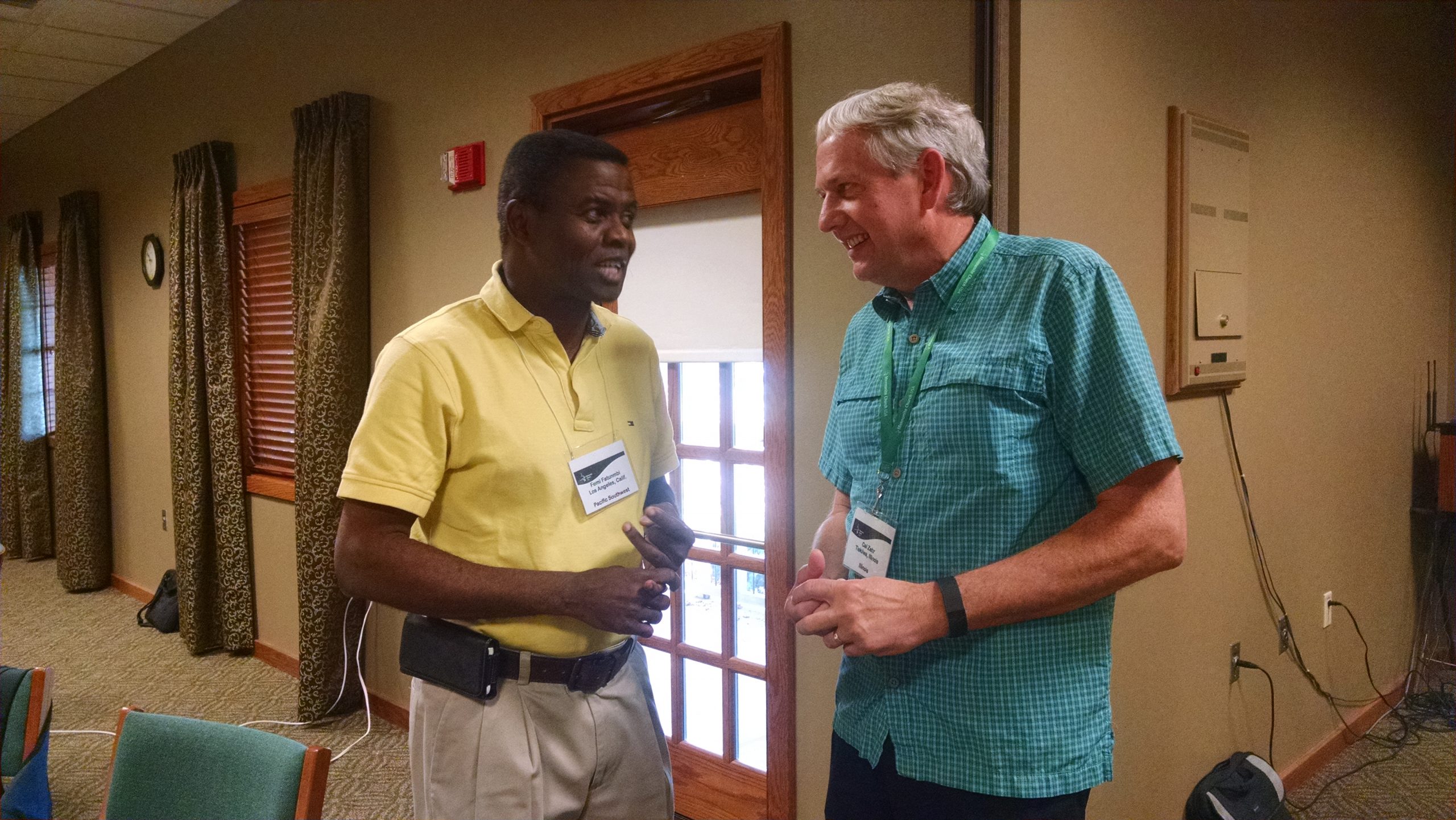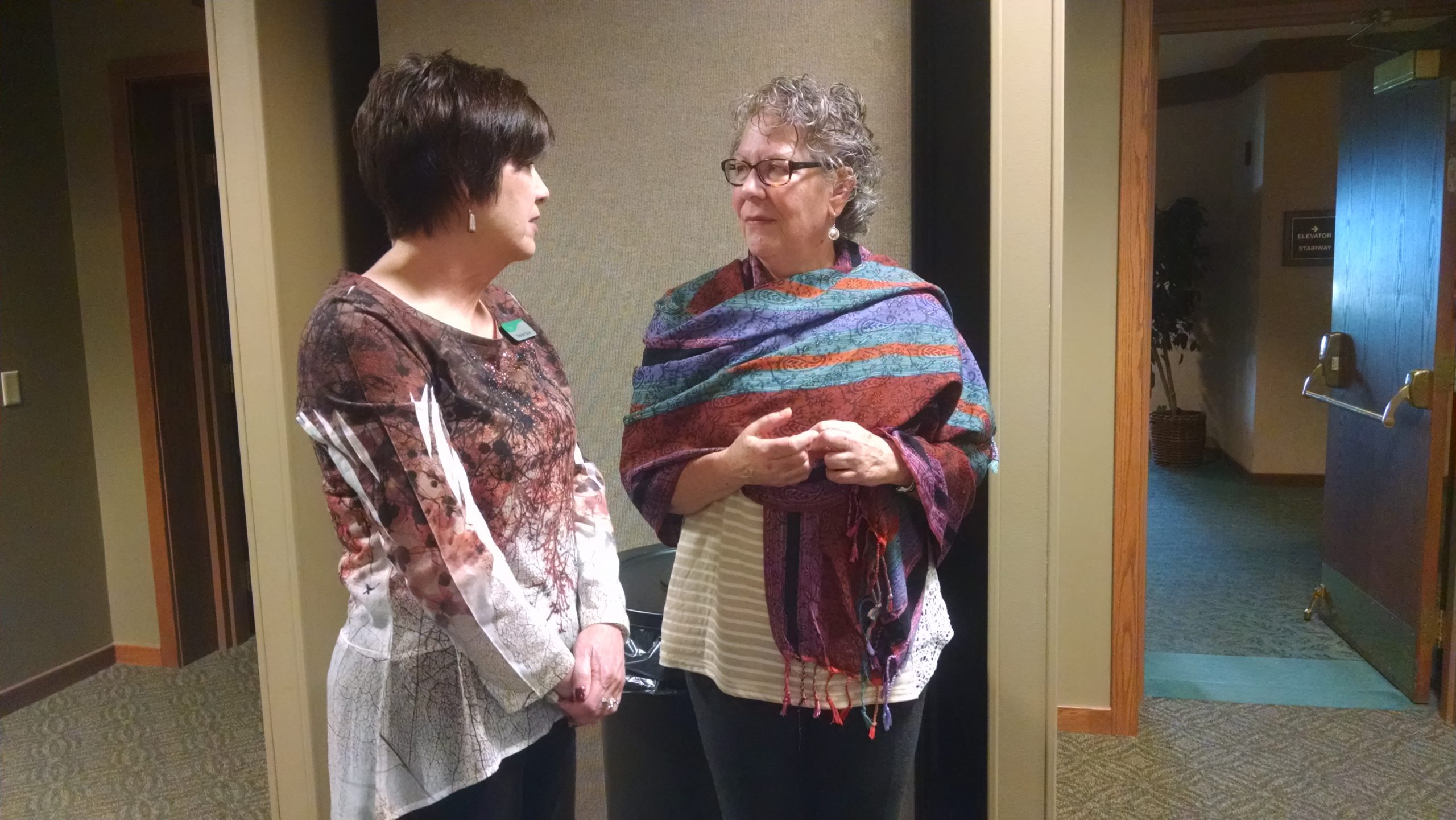
Femi Fatunmbi, moderator of Pacific Southwest Mennonite Conference, and Cal Zehr, moderator of Illinois Mennonite Conference, visit during a break at the Oct. 19–21 Constituency Leaders Council meeting in Archbold, Ohio. (Photo by Hannah Heinzekehr)
[Español]
By Janie Beck Kreider
(Mennonite Church USA) — On Oct. 19-21, the Constituency Leaders Council (CLC) of Mennonite Church USA met at the Sauder Heritage Inn in Archbold, Ohio, for its biannual gathering. The agenda included exploration of the CLC’s role as elders and an opportunity to hear from three area conferences at various stages in the process of separating from the denomination.
The role of elders
The Membership Guidelines resolution calls on the CLC “to take seriously its role as ‘elders’ for the denomination, ‘discerning and advising the Executive Board, the Delegate Assembly and Mennonite Church USA on issues confronting each of them relative to faith and life.’”
To help lay the groundwork for the discussion, Robert J. (Jack) Suderman, former general secretary for Mennonite Church Canada, presented on the biblical and theological foundations of the role of elders in the church.
“In the text, the word ‘elder’ has authority, not in the sense of imposition or lording it over people, but through humility, discernment, giftedness, wisdom, experience and age,” explained Suderman. “It is a shepherding function as well as an overseeing function, or we might say, ‘seeing the big picture.’”
Naming fears

Shelley Buller, executive assistant for Mennonite Church USA’s Executive Board staff, and Paula Killough, senior executive for Advancement for Mennonite Mission Network staff, visit during a break at the Oct. 19–21 Constituency Leaders Council meeting in Archbold, Ohio. (Photo by Hannah Heinzekehr)
Throughout the meetings, CLC members were given space to name their fears about accepting the role of denominational elders.
“This is an advisory council, not a decision-making body,” said George O’Reilly, transitional conference leader for the Ohio Conference of Mennonite Church USA. “Our only power is the power of our influence, and I think that is what is being asked of us.”
Some questioned whether taking on this role was what the delegate body was asking of them and expressed discomfort with the potential of taking on too much authority.
“Do we really represent the church?” asked Marlene Bogard, executive director of Mennonite Women USA. “Who is asking us to be elders?”
“While not being responsible for the outcomes of decisions makes it easier to stay open and offer counsel, we are definitely responsible for the results of our influence,” commented Jack Swaim, a member of the Pacific Northwest Mennonite Conference board.
“From my outsider’s perspective, the biblical role of elder is descriptive of what you have already been doing [as the CLC] for the past 15 years,” reflected Suderman. “The CLC’s elder role is a gem in your system. We in Mennonite Church Canada covet this piece of your polity.”
Claiming their identity
Living into this newly defined role, the CLC spent most of their time discussing denominational eldership in regard to five topics: (1) its implications on the CLC’s work of discernment on behalf of the church, (2) its influence on their work in area conferences, (3) its role in working with conflict among conferences, (4) how to open up spaces to encourage dialogue and discernment with LGBTQ (lesbian, gay, bisexual, transgender, queer) members of the church, and (5) how to respond when conferences and congregations question their willingness to be part of Mennonite Church USA.
On the final morning of the meetings, responses from each table group to each of these questions were combined into short summaries that highlighted common threads and themes in the feedback.
In responding to conferences and congregations considering whether to leave Mennonite Church USA, the summary of responses stated, “We will draw upon our committed relationships to prayerfully walk with one another, listening to understand and clarify key issues, tending to the grief and joy of all, naming our shared hopes, and when necessary, to release and bless, always open to new possibilities.”
Ideas about how to open up spaces to encourage dialogue and discernment with LGBTQ members included appointing a task force composed of CLC members and representatives of the LGBTQ community, setting up structured opportunities to listen and learn from LGBTQ community members about their experience in the life of the church, encouraging area conferences and constituency groups to include gender-orientation diversity in appointing CLC representatives, and promoting educational resources and facilitators to guide listening and learning in area conferences and congregations.
Taking into consideration the summaries of the discussions on each of these five topics, Executive Director Ervin Stutzman will revise a descriptive statement of the role of the CLC as denominational elders for review by the CLC in March 2016.
CLC members were also invited to give counsel to the Executive Board regarding a petition the board received last July — a request that the Brethren Mennonite Council (BMC) for LGBT Interests be invited to serve as a constituency group of Mennonite Church USA, with representation on the CLC. Executive Board members will discuss the CLC’s written counsel regarding this petition at their meeting in February 2016.
Experiencing grief and loss
CLC members received the news of the Oct. 19 death of Hal Shrader, pastor of Trinity Mennonite Church in Glendale, Arizona, with shock and grief on the second morning of their gathering.
On the same day, three area conferences — Franklin, Lancaster and North Central — gave reports on their processes of exiting Mennonite Church USA.
Franklin Mennonite Conference
Allen Lehman of Franklin Mennonite Conference was the first to speak.
“Our process was the result of a controversy that has been going on for three decades,” he said. “It has fragmented us and used up our resources. Continued dialogue is unlikely to resolve it, and Mennonite Church USA lacks polity to address the matter. Unless we withdraw, a number of congregations will withdraw from Franklin.
“This separation will allow us to focus on Kingdom work,” he added.
Lancaster Mennonite Conference
Keith Weaver, Lancaster Mennonite Conference (LMC) moderator, spoke with regret about the conference’s many losses over the last 15 years.
“As moderator, I am aware that I am responsible to tend this group of congregations, and as we lead, we lead for the whole,” he said. “How many congregations should we be willing to lose? We have already lost 70. Should we be willing to lose another 100?”
Two women, both of whom are pastors in Lancaster Mennonite Conference, spoke about the pain of not having a voice in the decision to leave Mennonite Church USA. In LMC’s current structure, only bishops have the power to vote on these matters, and only men are allowed to serve as bishops.
“I don’t like struggle, obviously,” said Dawn Winey, associate pastor of Mount Joy (Pennsylvania) Mennonite Church. “At the same time, I’m okay if our conference needs to struggle with what happens to those who may no longer be welcomed if this proposal passes.”
“Help us,” was the plea of Karen Sensenig, pastor of Habecker Mennonite Church in Lancaster. “The voice of Lancaster Conference will become more homogeneous, lacking the voice of women and others in diversity. What about those of us who care deeply about broader connections beyond the conference?”
“Lancaster Conference is broken,” she continued. “Healing is always painful, but it is also hopeful. I maintain hope that in this breaking apart that there will be a new kind of coming together that will invite us all to more fully be a part of the mission of God.”
North Central Conference of the Mennonite Church
Jesse Swiers, North Central Conference moderator, spoke last. Swiers explained the process of consensus by which his conference chose to part ways with Mennonite Church USA. He also expressed the struggle of separation from a body of people he loves, and from people who have been his spiritual mentors.
“The recommendation to leave is the only thing that would’ve kept us together. If we would’ve stayed, there would’ve been four or five congregations left,” he explained. “After the decision, I felt a freedom that I can’t really express, even though my heart was breaking.”
This time of sharing ended with a litany of blessing and prayer for Franklin, North Central and Lancaster conferences.
Encouraging diversity
Reflections from the Listening Committee’s report included concerns that this CLC meeting had less Racial/Ethnic diversity than in the past. Later, while sharing final group reflections, Shannon Dycus, co-pastor of First Mennonite of Indianapolis and a CLC representative from Indiana-Michigan Mennonite Conference, said she felt “unsettled” by Karen Sensenig’s painful sharing and by the reality that “the table is not open to LGBTQ voices.”
Joy in the midst of challenges
“The expansion of your role might feel like a scary thing,” commented Stutzman in his ending remarks. “It is difficult to be subjected to the criticisms that come along with leading in a time of conflict.”
As the CLC members were sent out, CLC Chair and Moderator-elect David Boshart of Wellman, Iowa, encouraged the scattering body to remember their “baptismal birthright” in the midst of challenging times.
“I am hoping for the day when God will renew our relationships and bring new life,” said Boshart. “This is our baptismal birthright. We have passed from death to life. We need to tend our joy and our hope.”
The next meeting of the CLC will take place March 7–9, 2016, in Goshen, Indiana. For more information about how the CLC is formed and how it functions, see the Mennonite Church USA Organizational Quick Guide.
###
Images available:
Femi Fatunmbi, moderator of Pacific Southwest Mennonite Conference, and Cal Zehr, moderator of Illinois Mennonite Conference, visit during a break at the Oct. 19–21 Constituency Leaders Council meeting in Archbold, Ohio. (Photo by Hannah Heinzekehr)
Shelley Buller, executive assistant for Mennonite Church USA’s Executive Board staff, and Paula Killough, senior executive for Advancement for Mennonite Mission Network staff, visit during a break at the Oct. 19–21 Constituency Leaders Council meeting in Archbold, Ohio. (Photo by Hannah Heinzekehr)

